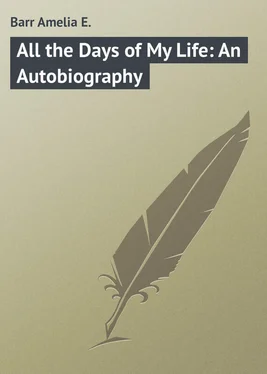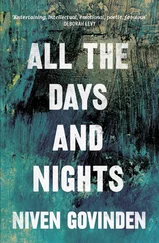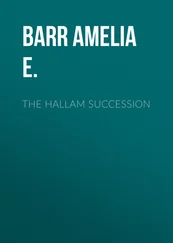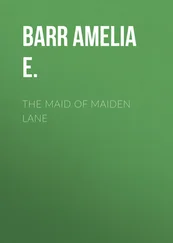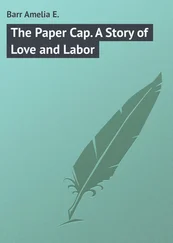Amelia Barr - All the Days of My Life - An Autobiography
Здесь есть возможность читать онлайн «Amelia Barr - All the Days of My Life - An Autobiography» — ознакомительный отрывок электронной книги совершенно бесплатно, а после прочтения отрывка купить полную версию. В некоторых случаях можно слушать аудио, скачать через торрент в формате fb2 и присутствует краткое содержание. Жанр: foreign_prose, foreign_language, на английском языке. Описание произведения, (предисловие) а так же отзывы посетителей доступны на портале библиотеки ЛибКат.
- Название:All the Days of My Life: An Autobiography
- Автор:
- Жанр:
- Год:неизвестен
- ISBN:нет данных
- Рейтинг книги:5 / 5. Голосов: 1
-
Избранное:Добавить в избранное
- Отзывы:
-
Ваша оценка:
- 100
- 1
- 2
- 3
- 4
- 5
All the Days of My Life: An Autobiography: краткое содержание, описание и аннотация
Предлагаем к чтению аннотацию, описание, краткое содержание или предисловие (зависит от того, что написал сам автор книги «All the Days of My Life: An Autobiography»). Если вы не нашли необходимую информацию о книге — напишите в комментариях, мы постараемся отыскать её.
All the Days of My Life: An Autobiography — читать онлайн ознакомительный отрывок
Ниже представлен текст книги, разбитый по страницам. Система сохранения места последней прочитанной страницы, позволяет с удобством читать онлайн бесплатно книгу «All the Days of My Life: An Autobiography», без необходимости каждый раз заново искать на чём Вы остановились. Поставьте закладку, и сможете в любой момент перейти на страницу, на которой закончили чтение.
Интервал:
Закладка:
In my studies I was progressing well, even my musical efforts were beginning to make a little show. I had distinctly told my teacher that I wished to learn “tunes” and “songs” and without regarding my wishes, she had compelled me to make an astonishing study of what she called the gamut . To the study of the gamut was added an hour’s practice of the scales daily, and as the necessary noise would have been distracting to my father, I went to my teacher’s home to make it. This practicing often stood in the way of pleasures, and Jane, who had urgently entreated not to learn music, had many self-complacent little observations to make on her own prudence. For while I was studying scales, major and minor, she went with Mother to shop, or to make calls. And she had a nice ladylike way of comparing things, that was very discouraging. Yet I had not the slightest intention of stopping my music lessons, and indeed I feel sure Father would not have permitted me to do so, except for some good reason. Once only I made a remark tending in that direction, and he answered,
“I allowed you to learn music, Milly, at your own eager request. Are you going to give it up because it is difficult? I should feel ashamed of you!” and he spoke with such scorn that I hastened to assure him, “I would not give up music for anything.”
My third year in Penrith remains very clearly in my memory. It was an anxious year to all, for Chartism was keeping the country in constant rioting and turmoil. I can remember well, the terror and hatred which the very name “Chartist” called forth; for the scenes of the French Revolution were yet red and flaming in the memories of men and women. The very day Victoria was crowned, the military were compelled to put down the rebellion led by John Thom, who claimed to be the Messiah, and if the numbers who followed him had been larger and better educated, the worst scenes of the French Days of Terror might have been repeated. 2 2 Judging Chartists by their own words we should not now think they merited exile, hard labor, and life imprisonment. I do not suppose I ever understood their claims, but I have looked up their record and I find they were fighting for five not very wicked points: first, universal suffrage, excluding women, which was the great mistake of Chartism; second, the division of England into equal electoral districts; third, votes by ballot; fourth, annual Parliaments and no property qualifications for members; fifth, payments to every member for his legislative services. For advocating these demands, I saw in 1843, at Liverpool Railway Station, a long row of these Chartists chained together on their way to a convict ship which was to carry them to Botany Bay, or Norfolk Island.
For ten years after the coronation Chartism was a living, constant anxiety to the government and the people. Yet in the midst of this general fear, and the decay of business which it entailed, there occurred a serious quarrel agitating the whole country, about the Ladies of the Queen’s Bedchamber. The Melbourne government having lost the confidence of both Houses, a new Administration was to be formed, and Sir Robert Peel was entrusted with the duty. In performing it, Sir Robert removed the Ladies who had been long in attendance on Her Majesty, and gave their high positions, with the large emoluments accruing therefrom, to the wives of the nobles who had assisted him in forming the new government. The Queen was indignant and refused to part with her old friends. Sir Robert visited her, and declared a government could not be formed unless the high offices in her household were filled by ladies of the ruling party. Her Majesty in a firm, but polite letter told Sir Robert she could not agree to a course so repugnant to her feelings.
The discussions in and out of Parliament on this question, were long and violent. Every man and woman, every boy and girl in England, took part in them. The women were largely in favor of the Queen, and a great number of men, remembering her youth, thought she ought to be humored in a matter so personal. But in political and administrative circles, she was severely blamed, and that very often in unkind and even disrespectful and disloyal terms.
For some reason my father strongly disapproved her conduct. He said she was a child, and ought to be obedient to the advice given her by the active heads of the government; and over and over he declared there were far more important things to be attended to than the Ladies of her Bedchamber. I heard him telling my mother that the planters in the West Indies were ruined and asking relief from Parliament, the freed negroes having absolutely refused to work; and then in a voice full of anger he demanded why twenty millions of pounds had been spent to give the negro a complete life of laziness, while clever English mechanics were working twelve hours every day for a mouthful of bread – starving as they worked. And Mother would shake her head and answer, “It does seem hard, William.”
“Mary,” he would continue, almost in a whisper, “Mary! Mary! only think of what twenty millions of pounds could have done for our own poor men, and their starving, ignorant children! We had no right to give it. It was not our duty, until we had done our duty to the needy and oppressed of our own people.”
And I wonder today, if Father knew that he was talking Chartism. At any rate, it was the only time, and only way, I ever heard him name the Great Emancipation of 1833.
None of these arguments moved my mother’s loyalty; she was a warm – my father called her a most unreasonable – advocate for the Queen’s rights. Ann was equally loyal, and greatly elated when Mother ranged herself on the Queen’s side.
“It is more than I expected,” she said, “for Missis do always say ‘Amen’ to whatever Mr. Huddleston says. But the Queen is right!” she added. “That I will declare and maintain;” and Ann, who was rolling pastry struck the table a mighty blow with the rolling pin, which if it intimated her way of “maintaining” would certainly be effective.
In our school the quarrel was a very simple one. There were only three girls in it who were for Sir Robert Peel, and the father of one was in the post office, the father of the other a supervisor in the excise, and the third girl was called “Peel,” and was, or thought she was, a connection of the Peel family. Miss Pearson expressed no opinion on the subject, except, that it was not to be named in school hours; but as we walked to-and-from school, we talked only of the Queen, and of any fresh news that might have come to us. By “news” I mean solely the effects of this quarrel in the schools of Penrith, for in the man’s school, it had full swing. The boys had constant fisticuff fights, and the master enjoyed and encouraged them. He said they were making good soldiers for Her Majesty and that they ought to be proud of their swollen eyes, and bruises.
So the quarrel went on, making a grim sort of amusement in days of great public anxiety and alarm; until finally a specially called meeting of the Cabinet, decided in a kind of half-and-half way, in favor of the Queen retaining the Ladies of her Bedchamber, there being a precedent in the case of Queen Anne, who retained the Ladies of her Bedchamber a year and a half after their husbands had been dismissed from office. Father was then satisfied. There was a precedent. It was then and there I learned the word “precedent,” and its meaning. I wondered then, and I wonder yet at the power vested in these three syllables. It seems to settle constantly and satisfactorily difficult questions in law, and other departments of social affairs. In some way probably, every generation has associated it with,
“A land of settled government,
A land of just and old renown,
Where freedom broadens slowly down
From precedent to precedent.”
Интервал:
Закладка:
Похожие книги на «All the Days of My Life: An Autobiography»
Представляем Вашему вниманию похожие книги на «All the Days of My Life: An Autobiography» списком для выбора. Мы отобрали схожую по названию и смыслу литературу в надежде предоставить читателям больше вариантов отыскать новые, интересные, ещё непрочитанные произведения.
Обсуждение, отзывы о книге «All the Days of My Life: An Autobiography» и просто собственные мнения читателей. Оставьте ваши комментарии, напишите, что Вы думаете о произведении, его смысле или главных героях. Укажите что конкретно понравилось, а что нет, и почему Вы так считаете.
